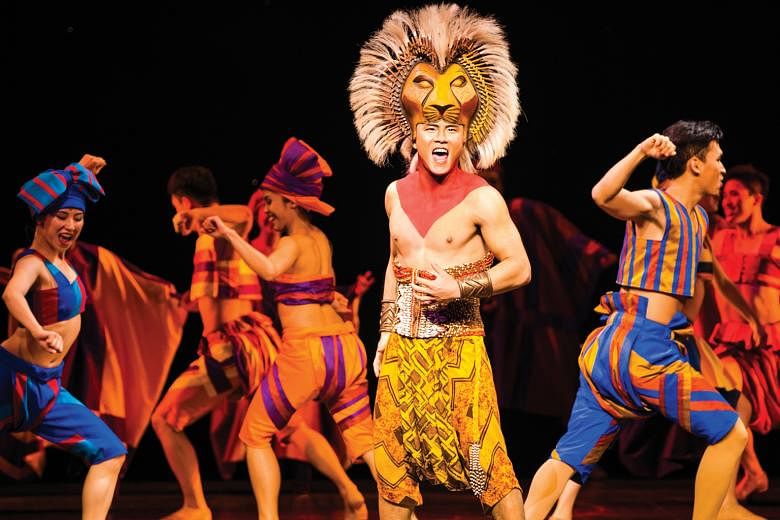SHANGHAI• On Broadway, Timon and Pumbaa have entertained audiences for years with their Brooklyn accents.
But in China, the famous meerkat-warthog duo not only speak Chinese, but they also do so with a distinct beifang, or northern, twang.
The rough-around-the-edges Chinese accent is one of several localised elements that infuse a Mandarin-language production of The Lion King at the new 1,200-seat Walt Disney Grand Theatre. The theatre is an anchor of the US$5.5-billion (S$7.4- billion) Shanghai Disney Resort, which opened last Thursday.
Sitting in the audience at the premiere last Tuesday was a contingent of Disney executives, including chairman Robert A. Iger. Local officials and a sprinkling of celebrities, including former National Basketball Association player Yao Ming, also attended.
There were other elements added to enhance the show for Shanghai: different regional dialects; riffs on Chinese pop songs; and, for the first time, a new character, the Monkey Master, who is based on the Monkey King, a figure of Chinese legend.
"The Monkey King is China's favourite character," Julie Taymor, the show's director, said in an interview the day before the premiere. "These little touches of familiarity are absolutely what you have to do. It makes the show recognisable."
The character wears a red and yellow Chinese-inspired costume designed by Taymor. Two feathers protrude from the monkey's hat like antennae. While Monkey Master does not speak, he bursts in to help fight for Simba, the lion protagonist, in several action scenes.
Since its Broadway debut in 1997, The Lion King has been translated into eight languages, including Japanese, Portuguese and Mandarin. In each translation, producers have sought to adapt the script to the local culture while maintaining the spirit of the original. Altogether, The Lion King has taken in US$7.2 billion from domestic and international productions.
Localising Broadway's top-grossing musical has been the focal point for the Shanghai Disney Resort.
Discussion about bringing a Mandarin version of The Lion King to China began in 2011, the same year officials broke ground on the Shanghai resort, said Mr Felipe Gamba, director of international production and strategy for the Disney Theatrical Group. The company had decided that it would build a theatre as an anchor for Disneytown, the retail and dining area of the complex.
Within the first few hours of the discussion, Mr Gamba said, it became "quickly obvious" that The Lion King would be the choice.
Soon after, Disney began a search in China for performers. Casting, however, proved to be far more difficult in China, where Broadway- style musical theatre is still relatively new. Chinese actors are typically affiliated with theatre companies and schools, which limits their availability for outside jobs.
"Like most people in China, I had only watched the movie version of The Lion King," said Zhao Lei, 28, who plays Mufasa in the show. "Even as a graduate of the Shanghai Dramatic Arts Center, I hadn't seen an original production before I joined the show."
In the end, casting took about 21/2 years - more than three times the average, Mr Gamba said. The cast of more than 50 features mostly mainland Chinese actors and actors from countries including the Philippines.
NEW YORK TIMES

